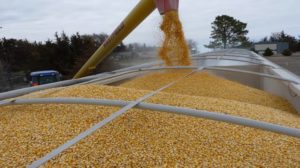News
Coronaprenuers: CS Munya And Noah Wekesa On The Spot Over Sh10B To Import Maize As The Country Battles Coronavirus

The Strategic Food Reserve Oversight Board has issued an advisory for importation of two million bags of white maize before May to curb a possible flour crisis amid projections that stocks will run out by April.
SFR chairman Noah Wekesa said the food agency had written to the Ministry of Agriculture, which is expected to come up with a cabinet memo on the importation.
The move, which could open another round of war between the government and farmers over grains, will see the board import two million bags of white maize and an additional two million of yellow ones to be used for processing of animal feeds.
“We do not have any reserves at the moment and we would like the government to move with speed to allow imports and curb a possible crisis, that is why we have written to our parent ministry requesting it to allow imports,” said Dr Wekesa.
Agriculture Principal Secretary Hamadi Boga said they had received the letter from the board and that he would discuss the issue with his Cabinet Secretary Peter Munya.
“This requires a decision to be made by the Cabinet and I will have discussions with the CS over the issue,” said Prof Boga.
The PS said a food security committee that moved round the country assessing the stocks said it can only last up to the end of April.
Maize coming outside the East African Customs Union is subjected to a 50 percent duty. The Treasury normally scraps the tax in the event of imports to allow in the produce at a cheaper cost.
The board clashed with the Ministry of Agriculture last year when the latter wanted to import maize as a precautionary measure for the expected shortage.
The importation of maize was a contentious issue between the board and the Agriculture ministry. Whereas the board wanted importation of 2.5 million bags before they rescinded the matter, the ministry stated a figure of 12.5 million bags to be shipped in, leading to a standoff. The ministry had made elaborate plans to import 11.1 million bags of maize from Mexico to bridge the deficit.
Nairobi had announced in March last year that Kenya would run out of maize at the end of July and wanted the country to ship in grain from Mexico before the situation could get out of hand.
The pressure saw then Agriculture Cabinet Secretary Mwangi Kiunjuri change his mind on imports from Mexico, saying maize would be procured from regional countries such as Malawi and Zambia, which have been a major source of the grain in times of shortages.
Kenya might not be lucky to get stocks from these countries this year as it is also grappling with a shortage, with Tanzania, which is about to start harvesting expected to sell its crop to its southern neighbours.
In 2017, the government was accused of stage-managing a crisis by ignoring all warning of an impending shortage only to flood the market with the staple when local farmers were harvesting, causing them great losses.
The government said a food security committee that moved round the country assessing the stocks indicated that the available stocks can only last up to the end of April, meaning that Kenya will have to seek alternative stock to cushion consumers from high prices of flour.
SFR has so far exhausted all the buffer stocks that is normally used by the country to cushion against hunger in times of a serious grain shortage.
Cereal Growers Association will be meeting next week to come up with a position on planned imports by the SFR.
“We shall be meeting as members to agree on the way forward in regard to the planned imports and give our stand on the issue,” said CGA chief executive officer Anthony Kioko.
Farmers have for long been opposed to imports arguing that it affects the price of local produce, hence subjecting them to losses.
In 2017, the government was accused of stage-managing a crisis by ignoring all warning of an impending shortage only to flood the market with the staple when local farmers were harvesting, leaving them with great losses in 2018 for as low as Sh1,800 per bag from a high of Sh2,500 in the previous season.
Maize production in the last season was forecasted to drop by 10 million bags following a reduction in area under the crop as a result of delayed rains, which saw some farmers shift to other crops.
As a result of the tightening supply of maize in the market, the price of maize flour has remained high in the market with a two kilo packet retailing at Sh130 since last year in May.
The government had projected last year the production would decline by 10 million bags due to erratic weather witnessed during the planting season of 2019.
Imports may not go well with farmers who have on many occasions opposed the move, arguing that it is meant to benefit a few individuals at the expense of local processors.
As the government grapples with the coronavirus pandemic, one of the most commendable efforts has been to mitigate the suffering of Kenyans.
This it has done by coming up with a stimulus package that includes granting tax breaks, employment support and loan deferments to cushion the people against the economic impact of the pandemic.
It is, therefore, surprising to hear Agriculture Cabinet Secretary Peter Munya say that the government will not buy maize from Kenyan farmers.
When he announced that the country was facing a serious food crisis, with the available maize only adequate to last a month, there was some flicker of hope in some Kenyans amid the gloom.
He said this would necessitate imports to plug the deficit and ensure that Kenyans, who are already feeling the coronavirus burden, do not starve.
AVERT SHORTAGE
The government, which has always played a vital role in buying grain from farmers through the National Cereals and Produce Board, has, according to CS Munya, withdrawn from the business of buying or importing grain.
This is meant to fight the endemic corruption in the grain business. However, the situation the country is dealing with at the moment is not one in which to introduce or review policies.
We are dealing with a desperate situation that calls for desperate measures.
The Agriculture ministry should be thinking seriously about how to enable the mopping up of all the maize stocks that farmers are still holding to help avert the looming shortage.
By buying from local farmers, the government will put some money into their pockets and enable them to meet their other pressing requirements.
CORRUPTION
Imports should only be sanctioned after all the maize the farmers are holding is bought. An added advantage is the potential savings on logistical expenses.
While we cannot fault CS Munya’s determination to fight corruption; it is also true from past experience that it is through allowing grain exports, as he has done, that graft in the grains sector has been entrenched.
Processors have been allowed to import four million bags of maize, but this could just open the floodgates at the expense of long-suffering Kenyan farmers.
Kenya Insights allows guest blogging, if you want to be published on Kenya’s most authoritative and accurate blog, have an expose, news TIPS, story angles, human interest stories, drop us an email on [email protected] or via Telegram
-

 Investigations1 week ago
Investigations1 week agoBillions Stolen, Millions Laundered: How Minnesota’s COVID Fraud Exposed Cracks in Somali Remittance Networks
-

 News1 week ago
News1 week agoUS Moves to Seize Luxury Kenya Properties in Sh39 Billion Covid Fraud Scandal
-

 Investigations1 week ago
Investigations1 week agoJulius Mwale Throws Contractor Under the Bus in Court Amid Mounting Pressure From Indebted Partners
-

 News1 week ago
News1 week agoMAINGA CLINGS TO POWER: Kenya Railways Boss Defies Tenure Expiry Amid Corruption Storm and Court Battles
-

 Business2 days ago
Business2 days agoEastleigh Businessman Accused of Sh296 Million Theft, Money Laundering Scandal
-

 Americas1 week ago
Americas1 week agoUS Govt Audits Cases Of Somali US Citizens For Potential Denaturalization
-

 Business2 days ago
Business2 days agoEXPLOSIVE: BBS Mall Owner Wants Gachagua Reprimanded After Linking Him To Money Laundering, Minnesota Fraud
-

 Business2 days ago
Business2 days agoMost Safaricom Customers Feel They’re Being Conned By Their Billing System


















